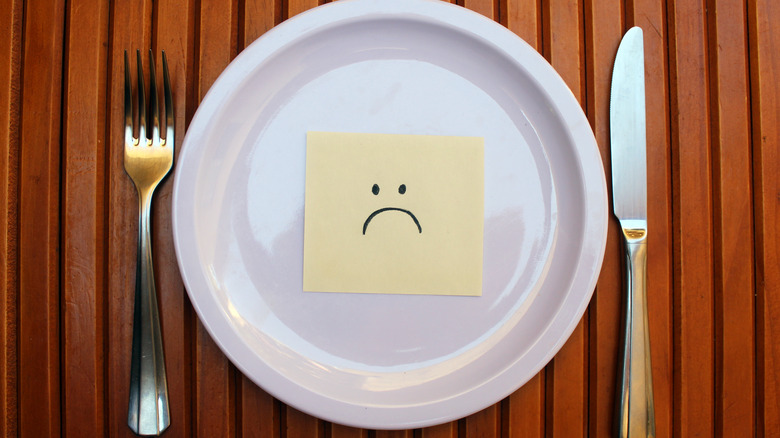The Real Reason The Master Cleanse Diet Is A Bad Idea
Who doesn't love a quick fix? Whether it saves you time, money, or energy, it's natural to want to find a more efficient solution. However, when it comes to diet and health, slow and steady wins the race. While there's no shortage of new crash diets presented as lifesavers, a few have been around for decades, regardless of whether they work or not. A prime example is the Master Cleanse, a diet promoted as a detoxifying weight loss plan. Thanks to plenty of praise and apparent results for Beyoncé and Gwyneth Paltrow, the cleanse has remained popular and desirable (via Jeffrey Steingarten, writing in Vogue in 2012).
According to The Master Cleanse, the primary online source about the diet, self-taught health practitioner Stanley Burroughs published a book outlining the cleanse in 1976. Healthline likens it to a juice or lemonade fast as it restricts consumption of solid food for 10 days. The primary beverage is a blend of lemon juice, maple syrup, and cayenne, and laxative teas and salt water are also permitted. As the name hints, the belief is that following this cleanse for 10 days assists your body in melting fat and eliminating toxins (via Healthline). The explanations to demonstrate how the concoction achieves magical effects are nebulous at best.
Is it effective?
Cathy Wong, writing earlier this year at Very Well Fit, notes that the health community agrees that the diet is risky. Furthermore, a 2015 study published in the Journal of Human Nutrition and Dietetics (posted by the National Library of Medicine) reported that there is no evidence to suggest that detox diets remove toxins. This is supported by the fact that our kidneys and liver have their own way of removing toxins without requiring restrictive fasting (via Health). Dietitian Gabrielle McGrath tells MindBodyGreen that the best way to encourage your body's natural systems is to drink enough water and eat plenty of fruits and vegetables.
As for weight loss, chances are if you're only drinking lemonade you'll probably lose a few pounds. However, as Healthline points out, unless there is a shift in your habits, you will gain the weight back once you start eating solid food again. In any case, the majority of the weight loss is water weight and muscle, according to Dr. Charlie Seltzer, which doesn't suggest lasting changes (via MindBodyGreen). Even worse, a 2010 study in Psychosomatic Medicine (also posted by the National Library of Medicine) found that severe calorie restriction increases the stress hormone cortisol, which appeared to be associated with weight gain and obesity in a 2017 research in the journal Obesity. Similarly, a review of numerous studies suggests that following calorie deprivation, the metabolism slows down to adjust efficiency, meaning that you have to eat less than before in order to avoid weight gain (via American Psychological Association).
What is a more sustainable method?
There's no denying that a strict regimen that allows for no actual food is uncomfortable and hardly sustainable. It can be downright dangerous if you are not careful, and McGrath warns that people with underlying conditions such as illness, pregnancy, or a history of disordered eating should steer clear of the Master Cleanse Diet (via MindBodyGreen). Even in healthy people, the side effects include digestive issues, cravings, low energy, dizziness, dehydration, and a scattered mind. While some doctors suggest a short bout of fasting could help reset your dietary habits, Ken Fujioka MD tells Everyday Health that after a few days the body goes into starvation and begins to store fat.
Ultimately, while you may feel lighter after drinking lemonade for 10 days, the effects don't last and the possible shifts in metabolism and overall health do not point to the achievement of long-term goals. Take your health into your own hands and make a conscious decision to choose whole foods and maintain physical activity. While it might not be a quick fix, it will definitely be more pleasant than any crash diet, and the results will actually stick over time.
If you are struggling with an eating disorder, or know someone who is, help is available. Visit the National Eating Disorders Association website or contact NEDA's Live Helpline at 1-800-931-2237. You can also receive 24/7 Crisis Support via text (send NEDA to 741-741).


